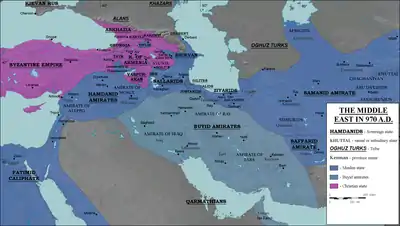伊朗間奏曲
伊朗間奏曲(英語:)[1]或稱波斯復興(英語:)是指伊朗的一段歷史時期,其間伊朗高原上各個伊朗本土穆斯林政權興起。这一时代出现在在公元7世紀波斯薩珊王朝被崛起的阿拉伯穆斯林征服後,截止于公元11世紀阿巴斯王朝阿拉伯人統治和權力的衰落、遜尼派復興、與塞爾柱土耳其人崛起,“间奏曲”因而得名。這種波斯復興包括伊朗人對伊朗地區的支持,最重要的是使用伊斯蘭形式把伊朗民族的精神和文化復興[2]。這段期間存在的伊朗王朝和政權有塔希爾王朝、薩法爾王朝、萨吉德王朝、薩曼王朝、齊亞爾王朝、白益王朝、和薩拉里王朝。[3]
根據歷史學家艾莉森·瓦卡(Alison Vacca)著作(劍橋大學出版社2017年出版)中的說法,伊朗間奏曲時期“實際上也包括一些其他伊朗人,主要為庫爾德人,還有存在亞爾明尼亞、高加索阿爾巴尼亞、和伊朗阿塞拜疆等前阿拉伯哈里發行省的小朝代”。[4]這些小朝代有拉瓦迪王朝、麥爾旺王朝、和沙達德王朝。[4]歷史學家博斯沃思在《伊斯蘭百科全書》第二版中指出,俄國東方學家米諾斯基認為拉瓦迪王朝在伊朗間奏時期發展頗為蓬勃。[5]
伊朗的穆斯林王朝
薩法爾王朝(公元861年-1003年)
薩法爾王朝(波斯語:)是位於锡斯坦地區的伊朗波斯帝國[6],統治期間為公元861年-1003年,疆土大致位在現今伊朗東南部與阿富汗西南部一帶[7],王朝首都在扎兰季。
薩吉德王朝(公元889年-929年)
薩吉德王朝 (波斯語:)是從公元889年-890年開始統治,直至929年結束的伊斯蘭王朝。領土包括阿塞拜疆和亞美尼亞的部分地區,首先建都於馬拉蓋以及巴爾達,之後再遷都至阿爾達比勒[8]。這個王朝起源於中亞的奧斯魯斯薩那省,屬於古代伊朗塞迦人的後裔[9][10]。
薩曼王朝(公元819年-999年)
薩曼王朝(Samanid dynasty,波斯語:),也被稱為為Samanid Empire,或簡稱為Samanids[11],是個統治中亞和大呼羅珊地區的伊朗帝國[12]。帝國名稱來自創始人薩曼·胡達,他出身信奉祆教的神權政體貴族[13],但後來皈依遜尼派伊斯蘭教[14]。
薩曼王朝家族來自巴爾赫(位於現今阿富汗)。王朝大力提倡藝術發展,進一步促進科學和文學的興盛,因此吸引魯達基和伊本·西那等學者前往。在王朝統治下,布哈拉與巴格達互爭榮耀。學者們指出,薩曼王朝復興波斯語的程度,遠勝於白益王朝和薩法爾王朝,同時他們也大力贊助由阿拉伯語寫就的科學和宗教作品研究。王朝朝廷在一項著名的勒令中宣布:「在這地區,使用的語言是波斯語,而統治的君王都是波斯人」[15]。
白益王朝(公元934年-1062年)

白益王朝,(Buyid dynasty,也被稱為Buyid Empire[16],或是Buyids (波斯語: Āl-e Buye, 裏海語: Bowyiyün),Buwaihids,或是Buyyids。是屬於什葉派的波斯王朝[17][18][19][20]。王朝起源於德萊木,是個邦聯,在公元10世紀和11世紀控制當今的大多數伊朗和伊拉克區域。這些從德萊木發跡的伊朗人王朝有意識地復興波斯薩珊王朝的象徵和習俗。實際上,從統治者阿杜德·道萊開始,王朝即使用古老的薩珊王朝頭銜「沙汗沙(Shāhanshāh)」(波斯語:شاهنشاه),字面意思是「萬王之王」。
薩拉里王朝(公元942年-979年)
薩拉里王朝(也稱為 Musafirids或Langarids)是個伊斯蘭波斯王朝,在公元942年至979年間統治伊朗阿塞拜疆、阿塞拜疆、和亞美尼亞等地的一部分而為人所知。
參見
参考文獻
- Such an obviously coined designation was introduced by Vladimir Minorsky, "The Iranian Intermezzo", in Studies in Caucasian history (London, 1953) and has been taken up by Bernard Lewis, among others, in his The Middle East: A brief history of the last 2,000 years (New York, 1995).
- The Middle East: 2,000 Years of History from the Rise of Christianity to the Present Day (pgs. 81–82) – Bernard Lewis
- Vacca, Alison. . Cambridge University Press. 2017: 5-7. ISBN 978-1107188518.
- Vacca, Alison. . Cambridge University Press. 2017: 7. ISBN 978-1107188518.
The Iranian intermezzo in fact includes a number of other Iranian, mostly Kurdish, minor dynasties in the former caliphal provinces of Armenia, Albania, and Azerbaijan before the arrival of the Seljuks, such as the Kurdicized Arab Rawwādids in Azerbaijan and the Kurdish Marwānid family in eastern Anatolia from the tenth to the eleventh centuries. Finally, the most famous Kurdish dynasty, the Shaddādids, came to power in Dabīl/Duin in the tenth century, ruling until the twelfth. The Shaddādids named their children after Sasanian shāhanshāhs and even claimed descent from the Sasanian line. It is the other branch of the Shaddādid family, which controlled Ani, that Minorsky offers as the “prehistory” of Salāḥ al-Dīn.
- Bosworth, C.E. . Bosworth, C. E.; van Donzel, E.; Heinrichs, W. P.; Lecomte, G. (编). . Leiden: E. J. Brill. 1995. ISBN 978-90-04-09834-3.
- The Cambridge History of Iran, By Richard Nelson Frye, William Bayne Fisher, John Andrew Boyle, Published by Cambridge University Press, 1975, ISBN 0-521-20093-8, ISBN 978-0-521-20093-6; p. 121.
- Nancy Hatch Dupree – An Historical Guide To Afghanistan – Sites in Perspective (Chapter 3)... Link (页面存档备份,存于)
- . [2020-01-15]. (原始内容存档于2013-01-27).
- Clifford Edmund Bosworth, The New Islamic Dynasties: A Chronological and Genealogical Manual, Columbia University, 1996. pg 147: "The Sajids were a line of caliphal governors in north-western persia, the family of a commander in the 'Abbasid service of Soghdian descent which became culturally Arabised."
- V. Minorsky, Studies in Caucasian history, Cambridge University Press, 1957. p. 111
- Encyclopædia Britannica, Online Edition, 2007, Samanid Dynasty, LINK (页面存档备份,存于)
- Aisha Khan, A Historical Atlas of Uzbekistan, Rosen Publishing Group, 2003, ISBN 0-8239-3868-9, ISBN 978-0-8239-3868-1, p. 23; Richard Nelson Frye, William Bayne Fisher, John Andrew Boyle, eds., The Cambridge History of Iran, Cambridge University Press, 1975, ISBN 0-521-20093-8, ISBN 978-0-521-20093-6, p. 164; The New Encyclopædia Britannica, 1987, ISBN 0-85229-443-3, p. 891; Sheila Blair, The Monumental Inscriptions from Early Islamic Iran and Transoxiana, Brill, 1992, ISBN 90-04-09367-2, p. 27.
- Elton L.Daniel, The History of Iran, p. 74
- C.E. Bosworth, ed and tr, The Ornament of Histories: A History of the Eastern Islamic Lands AD 650–1041, I.B. Tauris, 2011, p. 53.
- Richard Foltz, Iran in World History, Oxford University Press, 2016, pp. 56–58.
-
- Busse, Heribert (1975), "Iran Under the Buyids", in Frye, R. N., The Cambridge History of Iran, Volume 4: From the Arab Invasion to the Saljuqs., Cambridge, UK: Cambridge University Press, page 270: "Aleppo remained a buffer between the Buyid empire and Byzantium".
- Joseph Reese Strayer (1985), "Dictionary of the Middle Ages", Published by Scribner, 1985.
- Nagel, Tilman. . . [2012-02-08]. (原始内容存档于2018-12-25).
- MADELUNG, WILFERD. . Encyclopædia Iranica. [8 February 2012]. (原始内容存档于2021-01-06).
- Clifford Edmund Bosworth, The New Islamic Dynasties: A Chronological and Genealogical Manual, Columbia University, 1996. pp. 154–155.
- "Buyid Dynasty." Encyclopædia Britannica. 2008. Encyclopædia Britannica Online. 25 Jan. 2008 <http://www.britannica.com/eb/article-9018373 (页面存档备份,存于)>